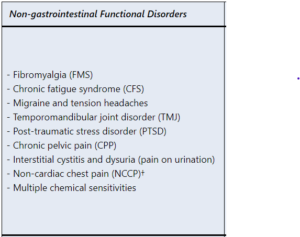Functional Disorders
Modern medicine focuses on diseases that have a basis in the structure or anatomy of the body systems rather than other disorders that have a basis in how the systems work. In effect, symptoms remain “unexplained” not because they cannot be explained but because some healthcare providers do not know how to explain them. Many functional disorders and symptoms occur that are non-gastrointestinal. In fact, functional disorders are prevalent in most body systems. Overlap or co-existence of the disorders is fairly common. Examples of well-recognized disorders include:- Fibromyalgia (FMS)
- Chronic fatigue syndrome (CFS)
- Migraine and tension headaches
- Temperomandibular joint disorder (TMJ)
- Post-traumatic stress disorder (PTSD)
- Chronic pelvic pain (CPP)
- Interstitial cystitis and dysuria (pain on urination)
- Non-cardiac chest pain (NCCP) – In some patients NCCP has a gastrointestinal basis
- Multiple chemical sensitivities
- Learn about the association of IBS with other non-gastrointestinal functional disorders
Other Disorders
Many other disorders can affect the digestive tract. Some can have symptoms that may be similar to or overlap with gastrointestinal (GI) functional or motility disorders. These will have uniquely identifying features which differentiate them from functional GI or motility disorders. Learn about the association of IBS with other non-gastrointestinal functional disordersExamples
- Celiac Disease
- Clostridiodes Difficile Infection (CDI) or C.Difficile
- Congenital Sucrase-Isomaltase Deficiency (CSID)
- Diverticulosis/Diverticulitis
- Eosinophilic Gastroenteritis
- Food Allergies
- Gastrointestinal Infections (e.g., Giardia, Yersinia)
- Inflammatory Bowel Disease (IBD)
- Lactose Intolerance
- Malabsorption
- Opioid Induced Constipation
- Volvulus










